Book contents
- Frontmatter
- Contents
- Acknowledgments
- Introduction
- 1 Apology of Socratic studies
- 2 Motivational intellectualism
- 3 The “prudential paradox”
- 4 Wrongdoing and damage to the soul
- 5 Educating the appetites and passions
- 6 Virtue intellectualism
- 7 Socrates and his ancient intellectual heirs: Plato, Aristotle, and the Stoics
- Appendix: is Plato's Gorgias consistent with the other early or Socratic dialogues?
- Bibliography
- Index of passages
- General index
5 - Educating the appetites and passions
Published online by Cambridge University Press: 04 August 2010
- Frontmatter
- Contents
- Acknowledgments
- Introduction
- 1 Apology of Socratic studies
- 2 Motivational intellectualism
- 3 The “prudential paradox”
- 4 Wrongdoing and damage to the soul
- 5 Educating the appetites and passions
- 6 Virtue intellectualism
- 7 Socrates and his ancient intellectual heirs: Plato, Aristotle, and the Stoics
- Appendix: is Plato's Gorgias consistent with the other early or Socratic dialogues?
- Bibliography
- Index of passages
- General index
Summary
EDUCATION AND MOTIVATIONAL INTELLECTUALISM
Installing beliefs, or inculcating the right habits?
In the last three chapters, we noted several passages in Plato's early or Socratic dialogues in which Socrates assigns an explanatory role to appetites and passions, and several others in which he proposes ways to manage these psychic forces properly. Such passages call for a complete re-evaluation of Socrates' moral psychology, we have argued, by which Socrates' intellectualism can be explained in such a way as to maintain some explanatory role for the appetites and passions.
In this chapter, we propose to extend our reconstruction of Socrates' moral psychology by focusing on what it means for Socratic education. We begin with a review of how the traditional account of Socratic intellectualism is committed to viewing Socrates' conception of education strictly in terms of changes in belief, whether by inculcating the right beliefs in early education, or by forcing a re-evaluation of one's beliefs in the light of inconsistencies revealed by Socratic examination. We argue, on the contrary, that a complete account of Socratic education must also recognize a role for the proper management of appetites and passions, and we explicate how Socrates would understand that role. We go on to sketch what the more complete Socratic education would be like, in regard to the appetites and passions. The upshot of our study, we claim, is a new and more adequate picture of Socrates' conception of education.
- Type
- Chapter
- Information
- Socratic Moral Psychology , pp. 132 - 152Publisher: Cambridge University PressPrint publication year: 2010



